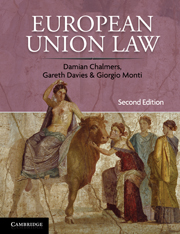Book contents
- Frontmatter
- Contents
- Map
- Preface
- Abbreviations
- Table of Cases
- Table of Treaties, Instruments and Legislation
- Table of Equivalents
- Electronic Working Paper Series
- 1 European Integration and the Treaty on European Union
- 2 The EU Institutions
- 3 Union Law-making
- 4 The EU Judicial Order
- 5 The Authority of EU Law
- 6 Fundamental Rights
- 7 Rights and Remedies in National Courts
- 8 Infringement Proceedings
- 9 Governance
- 10 Judicial Review
- 11 EU citizenship
- 12 EU Law and Non-EU Nationals
- 13 Equal Opportunities Law and Policy
- 14 EU Criminal Law
- 15 External Relations
- 16 The Internal Market
- 17 Economic and Monetary Union
- 18 The Free Movement of Goods
- 19 The Free Movement of Services
- 20 The Pursuit of an Occupation in Another Member State
- 21 Trade Restrictions and Public Goods
- 22 EU Competition Law: Function and Enforcement
- 23 Antitrust and Monopolies
- 24 State Regulation and EU Competition Law
- Index
4 - The EU Judicial Order
- Frontmatter
- Contents
- Map
- Preface
- Abbreviations
- Table of Cases
- Table of Treaties, Instruments and Legislation
- Table of Equivalents
- Electronic Working Paper Series
- 1 European Integration and the Treaty on European Union
- 2 The EU Institutions
- 3 Union Law-making
- 4 The EU Judicial Order
- 5 The Authority of EU Law
- 6 Fundamental Rights
- 7 Rights and Remedies in National Courts
- 8 Infringement Proceedings
- 9 Governance
- 10 Judicial Review
- 11 EU citizenship
- 12 EU Law and Non-EU Nationals
- 13 Equal Opportunities Law and Policy
- 14 EU Criminal Law
- 15 External Relations
- 16 The Internal Market
- 17 Economic and Monetary Union
- 18 The Free Movement of Goods
- 19 The Free Movement of Services
- 20 The Pursuit of an Occupation in Another Member State
- 21 Trade Restrictions and Public Goods
- 22 EU Competition Law: Function and Enforcement
- 23 Antitrust and Monopolies
- 24 State Regulation and EU Competition Law
- Index
Summary
INTRODUCTION
This chapter considers the judicial order within the European Union, comprising the Court of Justice and national courts and tribunals, and the institutional relations of this judicial order.
Section 2 considers the Court of Justice of the European Union. The institution comprises three courts: the Court of Justice, the General Court and the European Union Civil Service Tribunal.
A feature of EU law is that there is a joint responsibility between national courts and the Union courts for the interpretation and maintenance of EU law. Section 3 considers the central institutional features of this judicial order, which is governed by Articles 267 and 274 TFEU. The Court of Justice has an exclusive responsibility to declare EU measures invalid and to provide authoritative interpretations of EU law across the Union, whilst national courts have a monopoly over the adjudication of disputes. A further feature of this order is that its only subjects are courts. Institutional relations between them are not governed by a system of appeal by individuals but a reference from a national court to the Court of Justice on a point of EU law. The Court of Justice has sought to expand the subjects of this judicial order by allowing many bodies to refer, which would be considered regulatory or administrative bodies rather than courts under national law. It also allows any body to make a reference irrespective of national precedents or hierarchies.
- Type
- Chapter
- Information
- European Union LawCases and Materials, pp. 142 - 183Publisher: Cambridge University PressPrint publication year: 2010

